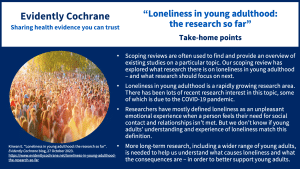In this blog for youth organisations or anyone interested in young adult loneliness, Emma Kirwan, PhD Researcher in the Department of Psychology at the University of Limerick, looks at what research can tell us about loneliness in young adulthood.
Take-home points:

Most of us have experienced the unpleasant feeling that we lack something in our social lives, either in the quantity or quality of our social relationships. This may have been during a particular time or transition point in life, like beginning university, changing jobs, or becoming a parent. This experience might have involved feeling sad and downbeat, or like you had nobody to rely on, even if surrounded by people. This is loneliness, the feeling when there is a mismatch between the relationships we have and those we would like to have. Loneliness can be experienced at any age, but young adults have the highest levels of loneliness in the UK1.
Exploring loneliness in young adulthood
Recently, loneliness has become somewhat of a buzzword in both research and the media, particularly during the COVID-19 pandemic. Although it is becoming recognised that it’s a real problem for young adults, and we have more and more studies on this topic, we wanted to find out what do we actually know about the research so far on loneliness in this age group?
A better understanding of loneliness during this life stage is a key step to preventing and reducing the potential harm of loneliness. Our goal was to provide a clear overview of the research on loneliness in young adulthood.2 In particular, we wanted to see how loneliness is defined and measured in studies, what causes and consequences of loneliness have been looked at in young adults, and what are the characteristics of the young adults included in research (such as university students or young adults with chronic illnessA health condition marked by long duration, by frequent recurrence over a long time, and often by slowly progressing seriousness. For example, rheumatoid arthritis.). We looked at 203 studies about loneliness in young adults, aged 18 to 25 years, published from 2016-2021.
The state of research on loneliness in young adults
The research on loneliness in young adulthood is growing, almost half of all of the studies we found were published recently, in 2020 and 2021. Some of this growth was due to the focus on loneliness during the coronavirus pandemic.
We also learned that most studies described loneliness as an unpleasant and subjective experience that happens when a person feels that their social relationships aren’t meeting their needs. But we have little evidence of young people’s own perspective of loneliness. In other words, researchers have labelled loneliness as one thing, but we don’t know if young adults’ own meaning of the word loneliness, or their personal experience, matches this definition of loneliness. The fact that almost half of the studies did not clearly define loneliness leaves open the possibility that loneliness in young adults is poorly understood. This can be challenging when we want to measure loneliness or create programmes to help lonely young adults.
Much of the research on loneliness in young adulthood included groups that were either all or mostly university students. Although this is convenient for researchers, it does not fully represent all young adults. It can mean that research lacks diversity or excludes other groups, like young people who begin employment. Also, most studies looking at what leads to loneliness, and what are the consequences, tend to take a snapshot of loneliness at just one point in time – so we don’t know about young adults’ experiences over time.
Where does this leave us?
We know that loneliness is common in young adulthood and recognising the importance of exploring loneliness in this age group is a step in the right direction. However, to fully understand loneliness in this age group, we need more research that follows wider groups of young adults over a longer period of time. We hope that future research will consider young adults’ own subjective experiences and views on loneliness for us to fully understand this complicated experience, and to be able to better support lonely young people.
More information and support for people experiencing loneliness
Remember we can all feel lonely, no matter our circumstances. Loneliness is a very personal experience and people can have different reasons for feeling lonely. The Campaign to End Loneliness suggests some ways to manage loneliness:
- Don’t keep loneliness to yourself. Talking to someone you trust about how you feel, or accessing talking therapies through a health professional like your GP, can be a helpful way to cope.
- Invest time in new connections. If you can, joining local groups or classes that interest you can be a way to increase the opportunity for social interaction. Volunteering can also be a great way to feel involved in your local community.
- Prioritise looking after yourself. Planning your week to include an activity you enjoy, like spending time outdoors, can be a useful distraction for temporary feelings of loneliness.
If you are experiencing loneliness that is persistent or intense, or you feel that you need support, the Campaign to End Loneliness has a list of organisations that you might find useful.
References
1 BBC Loneliness Experiment. (2018). Who feels lonely? The results of the world’s largest loneliness studyAn investigation of a healthcare problem. There are different types of studies used to answer research questions, for example randomised controlled trials or observational studies.. Retrieved 4th Oct 2023 from https://www.bbc.co.uk/programmes/articles/2yzhfv4DvqVp5nZyxBD8G23/who‐feels‐lonely‐the‐results‐of‐the‐world‐s‐largest‐loneliness‐study
2Kirwan, E., Burns, A., O’Súilleabháin, P. S., Summerville, S., McGeehan, M., McMahon, J., Creaven, A. M. (2023). Loneliness in emerging adulthood: a scoping reviewExploratory projects that systematically map the literature available on a topic, identifying key concepts, theories, sources of evidence and gaps in the research. of the literature. [Manuscript under review].
Join in the conversation on Twitter with @Ekirwan8 @IrishResearch @CochraneUK or leave a comment on the blog.
Please note, we cannot give specific medical advice and do not publish comments that link to individual pages requesting donations or to commercial sites, or appear to endorse commercial products. We welcome diverse views and encourage discussion but we ask that comments are respectful and reserve the right to not publish any we consider offensive. Cochrane UK does not fact check – or endorse – readers’ comments, including any treatments mentioned.
Emma Kirwan is a mentee on the 2023 Communicating with the Public scheme facilitated by Evidence Synthesis Ireland.


